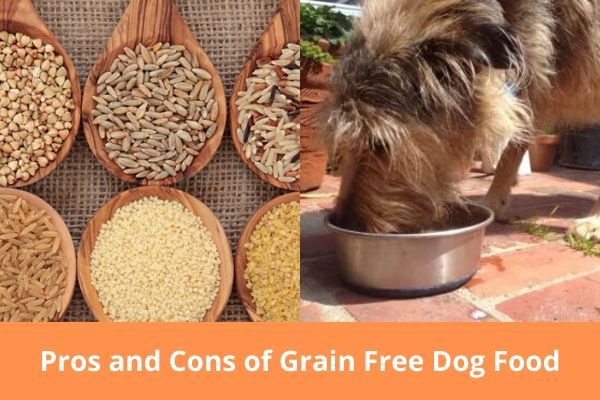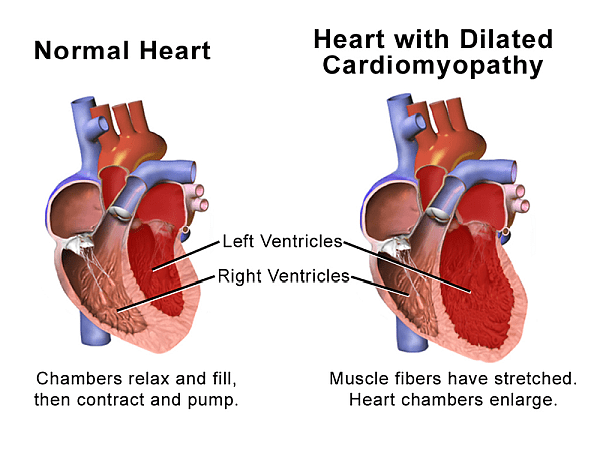There are pros and cons of grain-free dog food. Many people think that feeding their dog grain-free diet is better, but some experts suggest this isn’t necessarily true. There are various misconceptions we’ll discuss, including the FDA’s investigation on if grain-free is actually healthy for your dog. If you have any worries about whether your pet should be switched to grain-free, seek out your veterinarian’s advice.
What Are The Pros and Cons of Grain Free Dog Food?
Your pet is important to you. It’s not surprising that you want to make sure he gets a nutritious diet. But listening to your friends’ recommendations isn’t the same as doing valid research and learning what the experts say. We want you to have the best insider information so you can keep Fido healthy for years to come
One of the first things you should do before picking any new type of food for your canine is to review the ingredients. Consider the top 10 ingredients first. And then look to see if there are any additives that aren’t healthy for your pup. You’ll also want to know if the ingredients actually have the proper nutrients.
Let’s consider grain-free dog food. The name should clue you in that this type of product won’t have any grains in it. But you should find what substitutions the brand will use, as your dog does require certain chemicals from grains, such as taurine and fiber

Pros of Grain Free Dog Food
There are some benefits to grain-free food. If your dog has allergies, he might get more out of using a grain-free product than he would a regular dog food. Some common types of allergens your pet might be sensitive to are:
- Chicken
- Wheat
- Dairy
- Beef
- Eggs
- Corn
- Soy
You may require a vet’s assistance in diagnosing if your pet is allergic to a type of food. Because grain-free uses other ingredients in place of grains such as wheat and corn, your dog may be happier at dinner time with a new type of food specially designed for his sensitive stomach.
Grain-Free Helps With Weight Control
Grain-free is also great for dogs who need to have a restricted diet due to obesity. One of the great things about GF (grain-free) is that it keeps your dog feeling fuller for longer. This effect means they’ll have the desire to eat less. If your pooch is a constant eater, you should ask your vet about switching to grain-free.
One complaint that many dog parents have about their pet’s food is that the fillers in their pup’s food aren’t providing enough nutritional value. Veterinarians recommend a ratio of 50% veggie, 40% meat or protein, and only 10% grains. GF foods contain a higher proportion of protein and animal fats compared to carbohydrates, which meets experts’ nutritional guidelines.
I’m sure you know that carbs make you gain weight, so it makes sense that dog food with fewer carbs and higher protein would be a healthier choice for your weight-conscious dog. And you can expect Doggo to drop a few more pounds due to the abundance of energy he’ll get from his new food source.
Additional benefits of grain-free include:
- Fewer and smaller poop
- Healthier skin
- Shinier coat
- Less shedding
- Fresher breath
- Reduces flatulence

Cons of Grain-Free Dog Food
I don’t think there’s a product in existence that doesn’t have negative aspects, regardless of how great they actually work. Grain-free dog food is no exception. First off, grain-free is a lot more expensive than your average pet food. If you decide to switch your pet’s diet, be ready to shell out some extra cash.
Another con about grain-free dog food is that, although they may help some dogs lose weight, they might also do the opposite for other dogs. To provide a well balanced diet, dog food manufacturers use different types of ingredients in place of grains like wheat, corn, soy, or oats. They often use high carb veggies like potatoes, tapioca, and green peas. If your pooch has a slow metabolism, they might not lose weight as you expect from a grain-free diet.
The FDA is on Alert Regarding Grain Free Dog Food
One of the most critical cons that you should consider before switching to grain-free dog food is that the FDA has expressed concern that there is a link between grain-free dog food and over 500 confirmed cases of dogs with a condition called canine dilated cardiomyopathy, or DCM.
Experts from the Center for Veterinary Medicine (CVM), which is a branch of the Food and Drug Administration, as well as the Veterinary Laboratory Investigation and Response Network (Vet-LIRN), have conducted multiple studies to determine if it’s a coincidence or the cause.
What is DCM?
DCM (Dilated Cardiomyopathy) is a genetic heart disease that usually occurs in large breeds like the Great Dane or Doberman Pinscher. This condition causes the heart to enlarge, which weakens the heart muscles. As your pup’s heart swells, it loses the ability to circulate necessary blood throughout the body. If left untreated, it can cause the lungs to become filled with fluid. It can cause death within months and is the most common reason dogs suffer from congestive heart failure.

At one time, experts believed that small to medium breeds were not as vulnerable to this condition as their larger brethren. However, in the 500 open cases, there were dogs of various kinds, large and small. Experts also believe that DCM affects large breed males in middle to late adult life.
A few common symptoms of DCM are:
- Appetite loss
- Pale gums
- Increased heart rate
- Breathing difficulties
- Muscle weakness
- Fainting
What Causes DCM?
It’s unclear at this point what is causing the increase of dogs diagnosed with DCM, but there has been a strong correlation between grain-free dog foods and this condition. The most common theory is that GF foods have ingredients like peas, lentils, different types of legume seeds, and potatoes as their top 10 ingredients.
These substitute ingredients make up the 10% recommended grain portion of your dog’s diet. While each of these ingredients is high in protein, they don’t have taurine, which is an amino acid that is vital for the health of your dog’s heart.
Dogs can generally produce taurine. However, larger breeds cannot often create enough to keep them healthy. If you feed them a diet that isn’t offering enough taurine to supplement what they can’t naturally produce, you’re putting them at risk of DCM.
Consider Single Whole Grain Foods Instead
You might feel like you’re in between a rock and a hard place. Your dog requires grain as part of his daily nutrition, due to essential nutrients like fiber, which promotes proper digestion, as well as protein, taurine, and linoleic acid. But a diet too rich in grain and starch can cause health issues like gut dysbiosis, obesity, leaky gut, bowel inflammation, food sensitivities, diabetes, and allergies, or chronic inflammation of the digestive tract.
Yet grain-free foods might be a dangerous option for your pet, especially if he’s a large breed. Without taurine, which isn’t available in the correct concentrations with grain-free dog food, your dog will be at risk of severe heart disease, for which there is no cure. All you can do is treat the condition, and still might not be enough.
This debate has led some pet owners to consider using dog food made out of a single whole grain. Your dog will still get proper nutrition without having to worry about getting too much. Most single whole-grain foods have dried brown rice, which is a healthy single grain. Brown rice is higher in fiber, and it’s easier to digest. Perfect for sensitive tummies.
Talk to Your Vet Before Going Grain Free
We just looked at the Pros and Cons of Grain Free Dog Food, but allergies to grains are not as common as many pet owners think. It’s actually less than 1% of dogs. If your pet is having allergy symptoms after eating foods containing grains, it could be one of the other ingredients that are causing digestive distress. Always consult an expert before switching your pet to a new diet like grain-free, especially if he is a large breed dog that could be more vulnerable to dilated cardiomyopathy.

Kassidy Shepperd is the editor in chief for Canine-Prime.com. She is is a dog lover/trainer, a freelance writer and a volunteer at many pet rescue and shelter centers. Kassidy is based in Colorado and regularly writes for dog related magazines and blogs.


